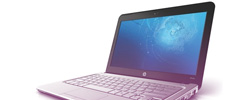Between tablets and netbooks, it’s easy to get confused and not know which one you should buy. While tablets are usually lighter, smaller and much simpler to use, netbooks have the upper hand when it comes to customization thanks to their full operating system. You will need to know what your needs are as a user and professional before taking a decision.
In this article, I’ll lay down the pros and cons of tablets and netbooks, and offer a conclusive comparison at the end.
Netbooks

Netbooks are small laptops. Their size usually varies from 7 to 11 inches and their weight from 2 to 4lbs. The battery life of a typical netbook can go from 2 to 5 hours, depending if it has a three or six-cell battery. Since the arrival of tablets, netbook sales have decreased a lot and blogs like Gizmodo even proclaimed them dead last month. However, they are still sold and remain an intermediary solution for shoppers looking for something smaller than a laptop, yet faster and most customizable than a smartphone.
Netbooks are ideal for browsing the internet, word-processing, watching video, playing online games, social networking and perhaps even doing some light photo editing.
Pros
- Very portable: Netbooks are small and easy to carry around with a weight from 2 to 4 lbs. They are light enough to fit inside a purse.
- Replaceable battery: Unlike tablets, Netbooks’ battery can be replaced easily by their owners. This way, if you travel, you can also carry a spare around.
- Operative system: Netbooks will usually carry Windows7 Starter Edition. This means you can install almost any program you want on your netbook. It also means you can install add-ons on your favourite browser, something you cannot do on a tablet. Basically, if you need a photo-editing program like Photoshop Elements or Picasa, you will be able to install it. Keep in mind though that netbooks are much slower than regular laptops.
- Low price: For a decent netbook, you will pay from $250 to $500. It’s more affordable than a regular laptop or desktop computer, as well as most tablets.
- Many choices: There are quite a lot of netbooks on the market to choose from. This can be confusing but it also means you’ve got a lot of options if you don’t like any particular model. Almost all major PC brands produce netbooks.
Cons
- Short battery life: Let’s face it: 2-5 hours of battery life in the best cases isn’t enough. You will need to carry your charger around at all time.
- Tiny screen resolution: The typical maximum resolution for a netbook is 1024×600 pixels, give or take. It’s small and most websites barely fit within that resolution. The desire to pull your eyes out is a common side effect you may experience after working for several hours on such a small monitor.
- Slowness and outdated hardware: You get what you pay for. Netbooks are affordable because the hardware inside them is outdated and slow. While most good laptops in 2011 have quad core processors, or at the very least a very good dual core, the best netbook according to CNET, the Asus Eee PC 1018PB, uses an Intel Atom N540. It does the job but it’s not very fast. The memory inside netbooks is also old and limited, usually 1 to 2GB DDR2. And there is no usually no possibility to update anything from within a mini-laptop.
- Netbooks sales are decreasing: Although this won’t affect you in the short-term, this trend means that in a few years, netbooks might have all but disappeared. Drawbacks to buying outdated electronics are difficulty getting customer support, spare parts and bad performances.
Tablets

Tablets are small flat and highly portable computers. Since the launch of the iPad in 2010, the tablet sales have sky rocketed. Their size generally varies from 7-11 inches and their battery life usually goes up to 10 hours for video playback (longer for tasks like reading or listening to music). They differ from netbooks because of their tactile interface and mobile operative system, designed to support most productivity and entertainment-related tasks. Although they are equipped with a touch-screen, most tablets offer an external keyboard option as well to accommodate users who like physical keyboards.
Although tablet sales are exploding, there are not a lot of good models. Apple and Samsung unarguably have the best tablets on the market and, as of September 2011, Apple owns 68.2% of the worldwide tablet market share, with reason.
Pros
Cons Both tablets and netbooks have advantages and inconveniences. But if you must pick, go for a tablet, more specifically an iPad if you don’t mind Apple, as the pros surpass the cons. The only feature netbooks have that tablets don’t is their operative system which gives you the freedom to install any software, but their hardware is so old and slow you will not be able to really use any heavy programs on them anyway. I own a netbook and although it’s a great alternative to nothing, I envy my friends who own tablets. Get a mini-laptop if Flash is extremely important to you (I don’t see why it would be though) or if you have a very tight budget and really can’t afford investing an extra $100 on a tablet.
Tablet vs netbook: the winner
